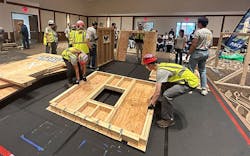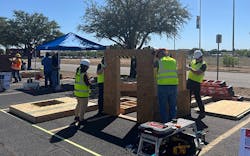2024 Timber-Strong Design Build Competition: Small Buildings, Big Educational Opportunities
Some designed playhouses. One team created a “barndominium.” And at least one erected a tiny pub.
Those are just three entry examples from the 2024 Timber-Strong Design BuildSM competition, which took place nationwide at college campuses this spring. Since 2019, the contest has given engineering students the opportunity to gain hands-on experience with wood design and construction. It also teaches teamwork, planning and demonstrates the value of prefabrication. What began as a giant Jenga contest more than seven years ago today attracts hundreds of participating students and over a thousand spectators. This year’s competition included 464 students from 46 schools.
APA – The Engineered Wood Association, the American Wood Council and Simpson Strong-Tie partner with the American Society of Civil Engineers to carry out the competition.
This year’s winners included teams from Michigan, Indiana, Florida, Colorado, Utah, Texas, California and Puerto Rico.
Participating students were tasked with drafting and building an attractive, sustainable and durable two-story wood-frame structure. Among its requirements:
- Maximum height of 12 feet.
- Openings for at least three windows (one per wall) on the first floor.
- A windowless first-floor wall must have a door.
- The second level must have a floor opening.
- The second floor must be cantilevered 12 inches in one direction.
- The second level must have framed openings for four windows (one per wall).
Teams prepare project budgets, adhere to Occupational Safety and Health Administration safety guidelines and the model building code. Each structure is required to show a continuous load path for both gravity and wind loads. Mirroring real-world conditions, each team had to navigate the submittal, requests-for-information and change order processes.
John Wilkinson, head judge for the Eastern Great Lakes region, said the contest allowed students to collaborate and use their skills in structural calculations, building information modeling and physical construction. And it was good practice for their future careers, he added.
“This competition is a great example of how the interactions between designers and instructors in the field (go),” Wilkinson said.
Aidan Zydiak was a captain for the University of Florida's design team. Zydiak said the competition gave him the chance to learn about BIM software for the first time.
"I feel that using the software was the most applicable part of the project to my career in the future," he said. "I also enjoyed cutting the wood and building the structure. Bringing the design to physical reality was satisfying."
The competition’s time constraints were also important. Aleeta Dene, an Engineered Wood Specialist in APA’s Field Services Division, said that although teams had 90 minutes to build their structures, finishing first wasn’t necessarily a goal.
“The most successful teams take it apart and put it together multiple times” to ensure the structure was built right, she said.
This year’s winners were:
Eastern Great Lakes Symposium Winners
First place: Michigan Technological University
Second place: Cleveland State University
BIM category: Cleveland State University
Indiana-Kentucky Symposium Winners
First place: Purdue University-West Lafayette
BIM category: Purdue University-West Lafayette
Southeast Symposium Winners
First place: Florida Agricultural and Mechanical University-Florida State University
Second place: University of Puerto Rico-Mayaguez
Third place: Florida International University
BIM category: University of North Florida
Region 6 Symposium Winners
First place: LeTourneau University
Second place: University of Texas-Arlington
Third place: University of Texas-Tyler
BIM category: LeTourneau University
Rocky Mountain Symposium Winners
First place: Colorado School of Mines
Second place: South Dakota School of Mines and Technology
BIM category: South Dakota School of Mines and Technology
Intermountain Southwest Symposium Winners
First place: Utah State University
Second place: Northern Arizona University
Third place: Boise State University
BIM category: Brigham Young University-Idaho
Pacific Southwest Symposium Winners
First place: California Polytechnic State University-San Louis Obispo
Second place: University of California-Irvine
Third place: University of California-Los Angeles
BIM category: California State University-Long Beach
For more information on the Timber-Strong Design Build competition, visit APA’s website.

